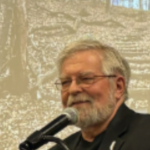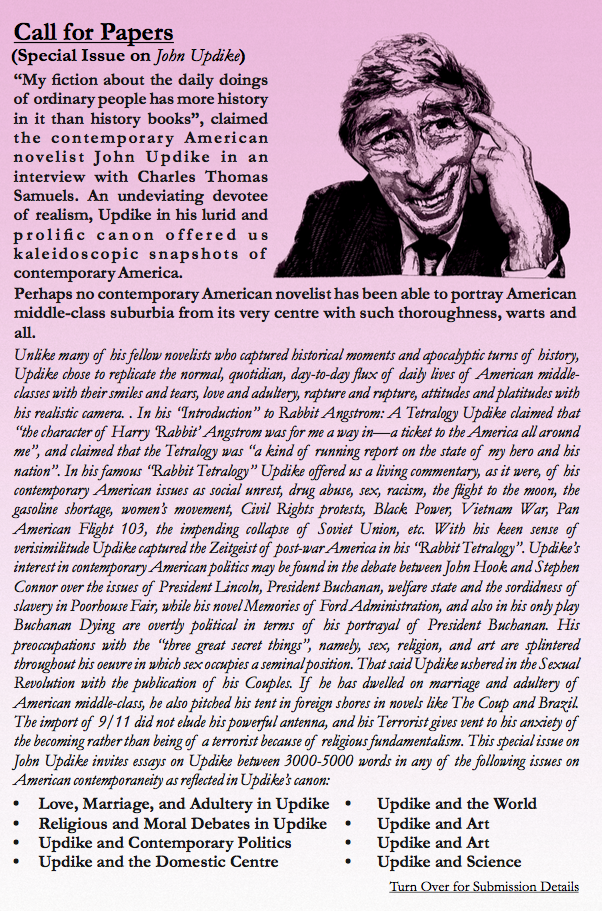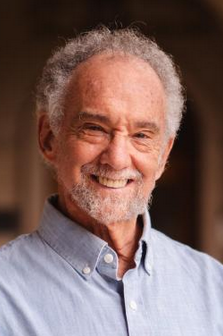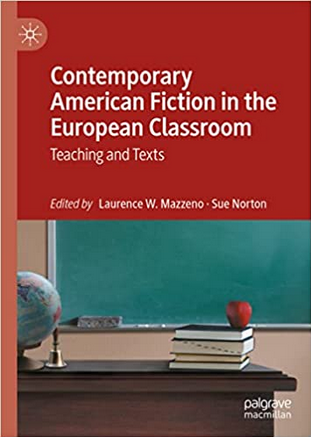 James Plath is best known to fellow Updike enthusiasts as president of The John Updike Society and an Updike scholar who edited two books of Updike interviews. But he’s also a creative writer, and after spending two weeks at Quarry Farm, the place where Mark Twain summered with his family for 20+ years, in addition to doing proposed research to write a comparative essay on how Twain modeled being both a celebrity and a writer for Updike, Plath felt compelled to write poems as well. The result: At Quarry Farm, a full-length collection published by Kelsay Books in 2025. He gave a reading on the campus of Illinois Wesleyan University, where he has taught American literature, journalism, creative writing, and film since 1988. The school’s student-run newspaper, The Argus, covered the event. Updike is mentioned in one of the poems.
James Plath is best known to fellow Updike enthusiasts as president of The John Updike Society and an Updike scholar who edited two books of Updike interviews. But he’s also a creative writer, and after spending two weeks at Quarry Farm, the place where Mark Twain summered with his family for 20+ years, in addition to doing proposed research to write a comparative essay on how Twain modeled being both a celebrity and a writer for Updike, Plath felt compelled to write poems as well. The result: At Quarry Farm, a full-length collection published by Kelsay Books in 2025. He gave a reading on the campus of Illinois Wesleyan University, where he has taught American literature, journalism, creative writing, and film since 1988. The school’s student-run newspaper, The Argus, covered the event. Updike is mentioned in one of the poems.
Category Archives: Publications
Updike’s early unpublished novel may soon lose the ‘un’
Trevor Meek, of The Local News (Ipswich, Mass.), published a Jan. 31, 2026 piece on the Selected Letters of John Updike that began,
“Living in Ipswich in the 1960s and ’70s with John Updike as a neighbor meant playing a high-stakes game of literary roulette. “On any given day, you might crack open his newest novel or short story to discover you’d been immortalized — or perhaps skewered — on a page destined to be read by millions around the world. “That uneasy thrill returned for some folks late last year with the release of Selected Letters of John Updike.
“’Even with this book, various people are looking through it to see if they’re mentioned,’ said Updike’s son, Michael, a sculptor. “’And then when they realize they are mentioned, they’re insulted,’ he added with a laugh.”
Michael Updike, heavily quoted in the article, defended his father against one of the most common charges. “He seems to be an author who is judged as a misogynist because some of his characters are selfish. . . . We don’t say Nabokov is a pedophile because his character Humbert Humbert is one in Lolita.”
 Michael Updike told The Local News that he’s working on the release of his father’s unpublished novel, Home. “We’re still figuring out how to get that rolling,” he said.
Michael Updike told The Local News that he’s working on the release of his father’s unpublished novel, Home. “We’re still figuring out how to get that rolling,” he said.
We asked Michael (pictured) for more details, and here’s what he had to say:
“Chris Carduff [who edited several of Updike’s Library of America volumes] gave us the idea, saying it was a completed novel albeit rejected by a publishing house. Jim Schiff [editor of the Selected Letters] has read it and says it’s not a perfect novel but does have a lot of new material about my grandmother in it. Andrew Wylie has been sent a copy and he thinks it should be published. So much of it is hand written, and our first step is to find a good typist who will type it up in Word. Then an editor to comb out any redundant or rough spots, and Wiley will shop it around. No timeline, but hopefully soon, by publishing terms—two or three years.”
Updike didn’t talk much about Home with interviewers, but he did tell Eric Rhode in 1969, ” I had written, prior to [The Poorhouse Fair], while living in New York City, a 600-page novel, called, I think, Home, and more or less about myself and my family up to the age of 16 or so. It had been a good exercise to write it and I later used some of the material in short stories, but it really felt like a very heavy bundle of yellow paper, and I realized that this was not going to be my first novel—it had too many traits of a first novel. I did not publish it, but I thought it was time for me to write a novel.”
If Home is as heavily autobiographical as Updike suggests, perhaps it will be read and appreciated as a companion to his Self-Consciousness: Memoirs (1989).
Raritan, now deceased, wasn’t a fan of John Updike
In Sheena Meng’s “A requiem for Raritan,” published on The Point, one thing rings pointedly clear: “The editors were not particularly fond of Updike. Richard Poirier and Thomas R. Edwards, both literary critics and professors of literature at Rutgers, leveled coolly disdainful gazes at him in their 1978 proposal for the magazine:
The publication of a new book by John Updike, let us say, is probably not an event of the same magnitude as the publication of a new book by Bellow or Pynchon, by Elizabeth Bishop or Doris Lessing … He seems at the moment to be a writer of comparatively, and predictably, lesser weight, and for whatever reasons he does not call into play the cultural forces and special interests that are at work on behalf (or against) these other writers.
 “It was their mutual confusion regarding Updike’s popularity that also solidified matters between Poirier and his successor, Rutgers historian Jackson Lears. One of the questions he had hoped to address when he founded the magazine, Poirier told Lears, was: How does a writer like John Updike get lionized and celebrated as if he’s some genius man of letters? Raritan, in other words, was interested in “cultural power,” as Poirier declared in his prefatory editor’s note: “those intricate movements by which ideas or events, canons or hierarchies of preference, minorities or cultural strata come into existence.” Updike, not considered ‘a sufficiently rewarding clue to something more important than the texts he writes,’ was given no notice in its pages.”
“It was their mutual confusion regarding Updike’s popularity that also solidified matters between Poirier and his successor, Rutgers historian Jackson Lears. One of the questions he had hoped to address when he founded the magazine, Poirier told Lears, was: How does a writer like John Updike get lionized and celebrated as if he’s some genius man of letters? Raritan, in other words, was interested in “cultural power,” as Poirier declared in his prefatory editor’s note: “those intricate movements by which ideas or events, canons or hierarchies of preference, minorities or cultural strata come into existence.” Updike, not considered ‘a sufficiently rewarding clue to something more important than the texts he writes,’ was given no notice in its pages.”
Sounds like Raritan‘s editors may have socialized with famous Updike detractors John Aldridge or David Foster Wallace, since all of the writers they cite as being superior have occasioned relatively the same level of interest from readers, and graduate students working on their theses or dissertations, as Updike.
New Yorker at 100 also celebrates editorial battles
 The New Yorker is taking the entire year to celebrate its centennial, and deservedly so. John Updike, whose first major publications were in those New Yorker pages, turns up quite a bit in the article by Jill Lepore on “The Editorial Battles that Made The New Yorker.” John Updike Society’s Dave Lull culled the sections that deal with Updike:
The New Yorker is taking the entire year to celebrate its centennial, and deservedly so. John Updike, whose first major publications were in those New Yorker pages, turns up quite a bit in the article by Jill Lepore on “The Editorial Battles that Made The New Yorker.” John Updike Society’s Dave Lull culled the sections that deal with Updike:
Dear Adam,
The piece recently submitted was
a) deemed unacceptable,
b) in need of significant rewriting,
c) lost behind a radiator.
John
Look for Updike in special century New Yorker collections
 For this entry we need to thank writer Sherman Alexie for calling it to our attention. Alexie gleefully (and deservedly so) posted, “There are only three writers who have work in both A Century of Poetry in The New Yorker [edited by Kevin Young] and A Century of Fiction in The New Yorker [edited by Deborah Treisman]: John Updike, Vladimir Nabokov, and me.” Alexie adds, “All I can do is laugh at how impossible this feels! It’s such a long cultural and economic journey for the reservation Indian boy that I was.” Congratulations, Mr. Alexie! The honor is much deserved.
For this entry we need to thank writer Sherman Alexie for calling it to our attention. Alexie gleefully (and deservedly so) posted, “There are only three writers who have work in both A Century of Poetry in The New Yorker [edited by Kevin Young] and A Century of Fiction in The New Yorker [edited by Deborah Treisman]: John Updike, Vladimir Nabokov, and me.” Alexie adds, “All I can do is laugh at how impossible this feels! It’s such a long cultural and economic journey for the reservation Indian boy that I was.” Congratulations, Mr. Alexie! The honor is much deserved.

Updike’s 1954 poem “Duet, with Muffled Brake Drums” made the cut for the poetry volume, while his 1991 story “The Other Side of the Street” earned a place in the fiction volume. In the latter, a man returns to the small Pennsylvania town of his childhood to clean out his mother’s home and claim a few of her possessions. Both books are available from your favorite bookstores and retailers.
MANOA shares published Updike letter
India-based journal to publish special Updike issue
Dossier of the Muses, an International Journal of Literary Studies, announced that Vol. 2:1 (July 2023) will be devoted to John Updike. The journal is based at Govt. College for Women M.A. Road, Srinigar Cluster University, Srinigar, J&K India, and the editor-in-chief, Prof. (Dr.) Ruhi Jan Kanth, is still accepting submissions until March 15, 2023, with revisions of accepted papers due April 30. Before submitting to editor@ijlsdom.com, read the updated submission guidelines at ijlsdom.com
Indian scholar publishes essay on Updike’s S.
Raghupati Bhatt’s critical essay, “John Updike’s Indian Connection,” was published in the International Journal of Scientific and Research Publications Vol. 4: 7 (July 2014). It is now completely downloadable online.
“The reader finds that Updike’s women characters have reached a new height in S.,” Bhatt writes. “She is searching her own identity. She is trying to develop her personality. She is groping her way out. She seems determined. She is not uncertain or totally submissive. She is not only an object of pleasure but she is out to enjoy the pleasure. She has given up the petty fears of morality, the social status and the family attachments. S. is representative of this woman against the background of religious commune and oriental philosophy. Updike has taken full notice of the women’s movements and the feminist critics.”
Arizona Quarterly publishes essay on Updike, Museums, and Women
Arizona Quarterly: A Journal of American Literature, Culture, and Theory, based at the University of Arizona and published online by Johns Hopkins University Press, included an important essay on Updike in the Volume 77: 4 (Winter 2021) issue: “John Updike: ‘Museums and Women,’ Women as Museums,” by Robert Milder, a member of The John Updike Society. The storied journal, which has been published since 1945, is edited by Lynda Zwinger and is based in Tucson, Arizona, where the society will meet for its 7th Biennial Conference in October, 2023.
Here’s the link.
Abstract:
Written in 1962 and published in five years later, “Museums and Women” is a series of vignettes featuring each of the most important women in his Updike’s life through that time: his strong-willed, mercurial mother; the schoolgirl its hero decides he loves; the Radcliffe student (a version of Updike’s Mary Pennington) he would marry; and the lover for whom he, like Updike, would nearly leave his wife. Beyond its status as an autonomous work of fiction, “Museums and Women” is a matrix for Updike’s semi-autobiographical treatments of love, sex, marriage, and infidelity. Focusing on “Museum and Women,” the essay moves outward to consider Updike’s life and work in thematically related writings across his career: stories of the 1960s and beyond, Marry Me: A Romance, Of the Farm, Couples, Self-Consciousness: Memoirs, and Villages, a late novel comprising a reassessment of his life as it was shaped by his relationships to women.
Milder, who holds a Ph.D. from Harvard University, is Professor of English at Washington University in St. Louis. His research interests are 19th and 20th century American authors.
Updike Society members publish second collaboration
A second collaborative collection of essays by Laurence W. Mazzeno and Sue Norton was recently published by Palgrave Macmillan in Switzerland. Contemporary American Fiction in the European Classroom: Teaching and Texts contains an essay on “John Updike in Serbia” by Biljana Dojčinović and Nemanja Glintić. Other writers covered in the book include Octavia Butler, Thomas Pynchon, David Foster Wallace, Donald Barthelme, Gloria Anzaldúa, Chimamanda Ngozi Adichie, Philip Roth, Colson Whitehead, Danzy Senna, Marilynne Robinson, Jesmyn Ward, William T. Vollmann, Toni Morrison, and Charles Yu. Also included is an additional resource provided by Norton: “Incorporating One’s Own Literary Criticism into the Curriculum: The Teachable Essay via John Updike’s Short Stories.” The book is also available as a Kindle edition.
From the publisher:
This book offers insight into the ways students enrolled in European classrooms in higher education come to understand American experience through its literary fiction, which for decades has been a key component of English department offerings and American Studies curricula across the continent and in Great Britain and Ireland. The essays provide an understanding of how post-World War II American writers, some already elevated to ‘canonical status’ and some not, are represented in European university classrooms and why they have been chosen for inclusion in coursework. The book will be of interest to scholars and teachers of American literature and American studies, and to students in American literature and American studies courses.
Laurence W. Mazzeno is President Emeritus of Alvernia University in Reading, Pa. He is the author or editor of 20 scholarly books, including Teaching Victorian Literature in the Twenty-First Century (2017) and Victorian Environmental Nightmares (2019). Sue Norton is Lecturer of English at Technological University Dublin, Ireland. She has published numerous articles and essays on topics in American literature as well as on classroom practice. Together they edited European Perspectives on John Updike (Camden House, 2018).






